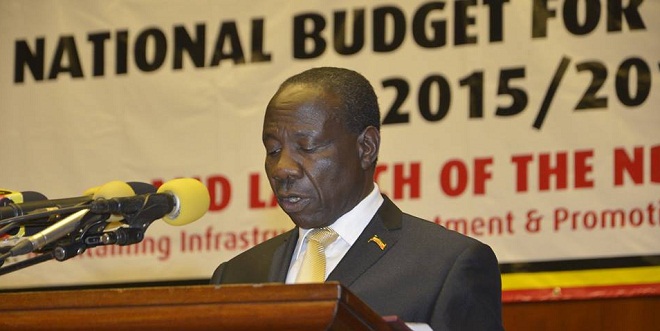
When The Independent put this question to Finance Minister, Matia Kasaija on Oct. 26, he was blunt. Kasaija said the political chaos is hurting the economy in a “substantial” way and that government would evaluate the situation and inform the country at an appropriate time.
“This fracas is making investors not to bring their money here; tourists fear to come here; if it were you, would you invest here in the current situation,” he said.
As he spoke, chaos appears to have enveloped the whole country as several Members of Parliament and other politicians consulted voters on whether or Article 102 (b) of the constitution should be scrapped to lift the presidential age limit and allow President Yoweri Museveni to run again in 2021.
One Edson Nasasira, a 22-year old man had on Oct. 18 been shot dead by Police that was dispersing irate Rukungiri residents at an opposition rally. Many other people, including MPs, were injured and hospitalised in different places across parts of the country in similar circumstances.
Repeated strikes by sections of public servants demanding higher pay fueled possibly by political expenditures also contributed to a sense of flux. Shs13 billion given to MPs for consultations over the amendment added to resentment among those suffering due to the slow economy.
Regionally, the situation in neighboring Kenya – Uganda’s largest trading partner in the region – remained politically unstable over disputed presidential elections. Spontaneous riots erupted in parts of the country as protesters kept police busy.
South Sudan, which is another big trading partner with Uganda, remains relatively peaceful following recent political turmoil. But demand for imports from Uganda remains depressed as anxiety and uncertainty persists.
In its Oct. 12 update on Uganda, the World Bank says, Uganda’s economy could be impacted by a flaring up of conflict in South Sudan and any renewed refugee inflows that would add to the estimated one million South Sudanese already in the country.
The WB added that further delays in the completion of public investment projects would prevent the productivity that could be gained from enhanced infrastructure, while acceleration in domestic arrears would have an adverse impact on private investment and worsen the credit challenge.
Private sector leaders are worried.
“The age limit matter is hurting the economy,” Gideon Badagawa, the executive director at the Private Sector Foundation Uganda (PSFU) said at a forum. He explained that numbers of tourist and potential investors had dropped rapidly.
“The earlier they resolve this matter the better otherwise our young and weak economy will be in shambles and this will cause even deeper political problems” he said.
But Martin Okumu, the head of communication at Uganda National Chamber of Commerce and Industry (UNCCI) says the age limit debate is a temporary situation and will end soon. Businesses will operate normally and investors will come, he said.
“Each and everything we do is linked to politics,” Okumu told The Independent, “Politics will always be interacting positively or negatively with economic activities at any one time in any country that is why we talk of political economy. It is a marriage between the two.”
Okumu says economic activities like export-import trade, exchange rate developments, and public investments, say in infrastructure, say a lot about how politics and economics affect each other.
“For people to take part in economic activity, they would read the political situation first and act later,” he says.
For now, these market sentiments remain topical in discussions about the direction Uganda’s economy could take in the short and medium term. Quick resolution of the political question could yield positive economic outcomes it appears. The inverse could drag the economy back into slow or no growth.
Recent quarter economic performance (illustrations) – Source: Bank of Uganda
In the quarter to August 2017, the current account deficit (sum of the balance of trade of goods and services exports less imports)narrowed to US$166 million from US$306million in the quarter to May 2017 as a result of improving of the sservices account balance by US$90 million due to increase in travel receipts in addition to other income related to inflows from personal transfers amounting to US$80million.
The merchandise trade deficit widened by 7.8% to US$389million on account of a 4.8% decrease in export receipts; imports decreased by 1.0% US$1,202million due to lower project and non-project government imports.
Interest ratescontinued to decline in the quarter – August 2017 in line with the eased monetary policy stance. However, time deposit rates averaged 9.3% in July and August 2017 compared to 9.4% in May and June 2017. The weighted averagelending rate averaged 21.6% in July and August 2017, compared to 21.1% in May and June 2017. Private sector credit remains subdued. Average annual growth in the quarter to August 2017 was 5.8% relative to 6.1% in quarter to May 2017. Demand for credit remains robust while supply remains subdued because lenders are risk averse.
The Uganda shilling remained relatively stable, averaging Shs3,599.6 against the US dollar over the last four months to August with realexchange rate depreciating by 5.5% in August 2017 compared to a depreciation of 4.1% in July 2017. This depreciation was driven by relative exchange rate and price movements with country’s major trading partners.
The stock of reserves at the end of September 27, 2017 was US$3.55billion, equivalent to 5.5 months of import cover.
 The Independent Uganda: You get the Truth we Pay the Price
The Independent Uganda: You get the Truth we Pay the Price



